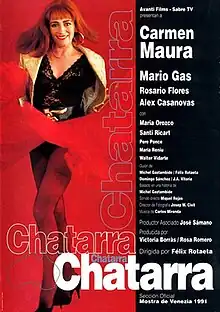| Chatarra | |
|---|---|
 Film poster | |
| Directed by | Félix Rotaeta |
| Screenplay by |
|
| Story by | Michel Gaztambide |
| Produced by |
|
| Starring |
|
| Cinematography | Josep M. Civit |
| Edited by | Ernest Blasi |
| Music by | Carlos Miranda |
Production companies |
|
Release dates |
|
| Country | Spain |
| Language | Spanish |
Chatarra is a 1991 Spanish neo-noir film directed by Félix Rotaeta which stars Carmen Maura, Rosario Flores, and Mario Gas.
Plot
Hooker Zabu, living badly with her daughter, is upended by the appearance of a stalking cop claiming to be her daughter's father, and vowing to take them two ouf of the fringes.[1][2]
Cast
- Carmen Maura as Zabú[3]
- Mario Gas as el policía[4]
- Rosario Flores as Mariló[4]
- Àlex Casanovas as Lino[4]
- María Orozco as Lola[4]
- Santi Ricart as Bambi[4]
- Pere Ponce as Romero[4]
- María Reniú as Madame Club Siempre[4]
- Walter Vidarte as Roca[4]
Production
The film was produced by Avanti Films and Sabre TV.[5]
Release
The film screened in competition at the 48th Venice International Film Festival in September 1991.[6] It was released theatrically in Spain on 18 October 1991.[4]
Reception
Ángel Fernández-Santos of El País deemed Chatarra to be an "uneven film, but with flashes of great cinema".[6]
Casimiro Torreiro of El País considered that, while not a perfect film, "with its faults and virtues, [Chatarra] nevertheless belongs to the line of independent films made with rigor and a good production design".[2]
See also
References
- ↑ "Chatarra". Fotogramas. 29 May 2008.
- 1 2 Torreiro, Casimiro. "Relaciones peligrosas". El País.
- ↑ Benavent, Francisco María (2000). Cine español de los 90. Diccionario de películas, directores y temático. Bilbao: Ediciones Mensajero. p. 190. ISBN 84-271-2326-4.
- ↑ ""Chatarra", una història de marginació". Igualada. Periòdic de l'Anoia: 10. 9 October 1991.
- 1 2 Fernández-Santos, Ángel (9 September 1991). "Grandes momentos de Carmen Maura en 'Chatarra', única película española". El País.